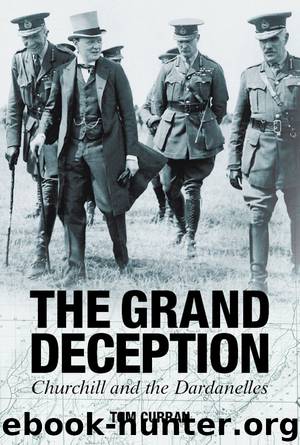Grand Deception by Tom Curran

Author:Tom Curran
Language: eng
Format: epub
Publisher: Big Sky Publishing
Published: 2015-06-26T16:00:00+00:00
CHAPTER 6
The Dardanelles Commission
A combination of public criticism and Parliamentary pressure forced the Asquith government to convene a Royal Commission enquiry in 1916 to determine how and why the Dardanelles fiasco had been conceived, and the reason for its failure. More than a thousand pages of evidence were presented to the Commission and it was allegedly on the basis of this evidence that the findings and conclusions of this seriously flawed body were determined — bearing in mind that three of the ten Commissioners recorded strong dissent against the official findings.
Creation
The call for a Royal Commission enquiry into the circumstances surrounding the inception of the Dardanelles campaign was first mooted on 4 May 1915, when Admiral Lord Charles Beresford told Parliament that at some future time an inquiry would have to be made into the campaign’s origins, and asked the Prime Minister to ‘make a statement on the subject’. Even before the disastrous landing of 25 April, he had already asked in Parliament, ‘Who is responsible for the [Dardanelles] operations?’1
Liberal MP and newspaper proprietor Sir Henry Dalziel had been denied the right to debate the Dardanelles ‘scandals’ in the Commons in June 1915.2 Twelve months later, however, following a similar military fiasco in Mesopotamia (in April 1916), the coalition government yielded unexpectedly to pressure in the Commons demanding that the documents relating to the Dardanelles and the Mesopotamian campaign be laid before the House.3
The convening of a large-scale enquiry into a military defeat while the war was still in progress was most unusual, but Asquith’s government had attracted frequent and harsh criticism over its handling of the Dardanelles campaign in particular. On 1 June 1916 Bonar Law, who was standing in for Asquith as Leader of the House, rashly acceded to the demands without prior consultation with the War Committee, Cabinet, the War Office, Admiralty or the Foreign Office.4 Hankey wrote to Asquith two days later, warning him of the likely harm to the government should Bonar Law’s commitment be allowed to stand. Asquith agreed, but added that ‘Parliamentary pressure was so great that he would have to publish something.’5 The ten-man Royal Commission appointed was chaired by Lord Cromer and included Field Marshal Lord Nicholson for the Army; Admiral of the Fleet Sir William May for the Navy; Andrew Fisher and Sir Thomas Mackenzie for Australia and New Zealand respectively; Liberal MP and lawyer Walter Roch for the Welsh soldiers at the Dardanelles, Captain S.L. Gwynne for the Irish and James Clyde for the Scottish; and Liberal MP Sir Frederick Cawley and High Court judge Sir William Pickford. The Secretary was E. Grimwood Mears.6
Evidence for the first report, which was published on 8 March 1917, was taken from 34 witnesses over the period 19 September to 4 December 1916. Only this first report, covering the events from 6 August 1914 to 23 March 1915, is germane to this account. The final report covered the military invasion of Gallipoli. The first report is unsatisfactory in many respects, as modern historians have commented.
Download
This site does not store any files on its server. We only index and link to content provided by other sites. Please contact the content providers to delete copyright contents if any and email us, we'll remove relevant links or contents immediately.
The Radium Girls by Kate Moore(10900)
The Templars by Dan Jones(4180)
100 Deadly Skills by Clint Emerson(4069)
Rise and Kill First by Ronen Bergman(4006)
The Doomsday Machine by Daniel Ellsberg(3725)
The Rape of Nanking by Iris Chang(3504)
Killing England by Bill O'Reilly(3447)
Hitler in Los Angeles by Steven J. Ross(3429)
Stalin by Stephen Kotkin(3078)
12 Strong by Doug Stanton(3052)
Hitler's Monsters by Eric Kurlander(2726)
Darkest Hour by Anthony McCarten(2643)
Blood and Sand by Alex Von Tunzelmann(2605)
The Art of War Visualized by Jessica Hagy(2405)
Hitler's Flying Saucers: A Guide to German Flying Discs of the Second World War by Stevens Henry(2287)
The Code Book by Simon Singh(2200)
The Second World Wars by Victor Davis Hanson(2129)
Babylon's Ark by Lawrence Anthony(2064)
Tobruk by Peter Fitzsimons(2053)
